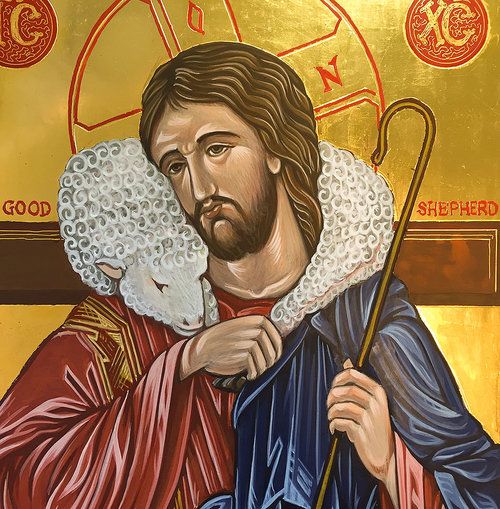Mount Calvary
Eutaw Street and Madison Avenue
Baltimore, Maryand
A Parish of the Roman Catholic Ordinariate of
of The Chair of Saint Peter
Rev. Albert Scharbach, Pastor
Summer Schedule
9:00 AM Sung Mass
Trinity VIII
Common: Merbecke
Hymns
The King of love my shepherd is (ST COLUMBA) was written by Sir Henry Williams Baker (1821–1877). It is notable for its skillful meter, and its well-managed rhyme scheme of single and double rhymes, which control and shape the emotion very beautifully. Baker gave Anglican slant to Psalm 23, interpreting it as a psalm of love and care, but stressing these qualities as evidenced in the Eucharist. The spread table of verse 5 becomes the altar on which the elements are displayed, and the delight comes as the believer takes the ‘pure chalice’; the unction, or anointing (from 1 John 2: 27), while bestowing grace in a spiritual sense, also has suggestions of a rite. This verse spreads its meaning through the whole hymn, allowing the words of Psalm 23 to acquire an extra significance: so that the last verse suggests that the length of days of a person’s life can be spent, figuratively, ‘within thy house for ever’, in the service and under the influence of the church, and then later in heaven. The singer can reflect back, and conclude that the first verses suggest the ransomed soul, sought out in love and rescued from sin (Baker’s version of ‘he restoreth my soul’). The beautiful use of the shepherd metaphor in verse 3, as the shepherd carries the lamb gently on his shoulder, is an illustration of the tenderness of Baker’s work: these lines, were the last words spoken by Baker on his deathbed.
Here is the Cardiff Festival Choir.
I heard the voice of Jesus say (KINGSFOLD)was written by the Presbyterian Horatius Bonar (1808–1889). The first verse is based on Jesus’ words in Matthew 11:28-31, the second on his encounter with the Samaritan woman by the well (John 4:10-14) and the third on his famous saying ‘I am the light of the world’ (John 8:12). The hymn is very direct and personal and offers a great sense of consolation and assurance to the weary soul.
Here is the Choir of Manchester Cathedral.
There’s a wideness in God’s mercy (IN BABILONE) is by Fredrick Faber (1814–1863). Faber was born an Anglican and reared a strict Calvinist. After attending Oxford, he took orders as an Anglican priest and began his ministry as a rector. Influenced by his friend John Henry Newman (1801-1890) who converted from Anglicanism to Roman Catholicism in 1845, Faber also converted to Catholicism that same year.
There are echoes of William Cowper in this hymn. Cowper (1731-1800), one of the hymn writers that influenced Faber during his Anglican youth, was an ardent Calvinist. His most famous hymn “God moves in a mysterious way” (which we sang last week) also has the sense that God’s sovereign power and understanding are far beyond human capabilities. Faber expresses this in stanza three: “For the love of God is broader than the measure of man’s mind.”
Cowper concludes his hymn with a similar idea. After exploring the immeasurable and incomprehensible nature of God’s acts, he concludes: “God is his own interpreter, and He will make it plain.”
The ultimate theme of Faber’s hymn is based on the premise and paradox that a sovereign God, unlike earthly rulers, demonstrates welcome, kindness, grace and mercy. All we need to do is have a simple faith that “rest[s] upon God’s word.”
Here is the parish choir of Our Lady of Refuge in Brooklyn. Here is an organ piece on the tune.
